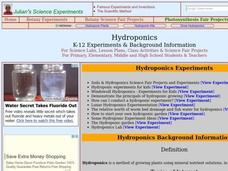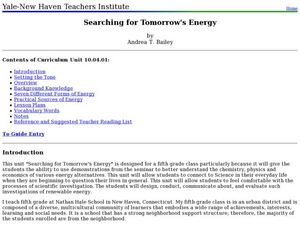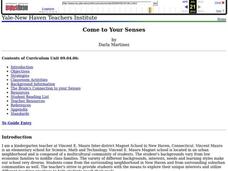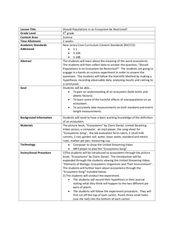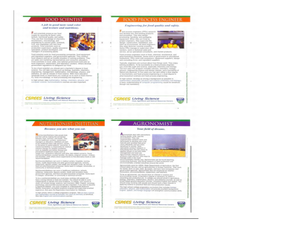Curated OER
Electric Power Transmission and Distribution
Students explain how power is transmitted over long distances. In this physics lesson, students simulate controlling power flow in parallel transmission lines. They discuss several applications of wireless power transmission.
Curated OER
Hydroponics
Students examine how to grow plants using a hydroponic system. In this hydroponics lesson students identify the advantages and disadvantages of growing plants hydrologically.
Curated OER
Rusting-A Form of Oxidation
Students conduct an experiment to observe oxidation. In this chemistry lesson, students explain how rusting happens. They rank metals according to their conductivity.
Curated OER
Testing Water for Hardness Using Soap Bubbles K-12 Experiments & Background Information
Students examine water and what causes it to become hard. In this water lesson plan students use the soap test and determine the mineral content and hardness of a sample of water.
Curated OER
Searching for Tomorrow's Energy
Fifth graders investigate energy. For this biology lesson plan, 5th graders will learn about energy, fossil fuels, and renewable and nonrenewable resources. Students will be participating in three lab activities which are described in...
Curated OER
What Are the Layers of the Rain Forest?
Students investigate the different levels of the rain forest by comparing it to an apartment. In this ecology lesson, students practice using forest related vocabulary words and complete a vocabulary data sheet. Students...
Curated OER
Come to Your Senses
Students explore their senses. In this biology lesson plan, students will learn about their senses, what affects them, and how the brain works to control our senses in a series of lab activities.
Curated OER
Saving Big Cats from Extinction
Students explore extinction. In this biology and environmental science instructional activity, students define extinction, identify what living things need to survive, and create a persuasive poster about "saving the big cats"...
Kenan Fellows
Microorganisms in Pond Water
That is living in the water? Groups of two to three view pond water with microscopes in order to find microorganisms. They draw pictures of the ones they find in their slides. The groups compare their drawings to pictures of common...
Teach Engineering
Preconditioning Balloons: Viscoelastic Biomedical Experiments
What does stretching a balloon have to do with equilibrium? Groups explore preconditioning by stretching a balloon to a point of equilibrium. They then measure the amount of force required to stretch the balloon to the same point several...
Teach Engineering
Slinkies as Solenoids
What does an MRI machine have to do with a slinky? This activity challenges learners to run a current through a slinky and use a magnetic field sensor to measure the magnetic field. Groups then change the length of the slinky to see...
Curated OER
Testing for Catalase Activity
In this catalase worksheet, students read about how enzymes work in cells. Then students conduct an experiment to test for catalase activity in potatoes. This worksheet has 1 graph and 6 short answer questions.
Curated OER
Sharks
Students research sharks, the food chain, and the water habitat shared by humans and sharks.
Curated OER
Microbiology Lesson Plan Aseptic Technique
Learners examine the importance of aseptic technique, become familiar with media plates, and general microbiology techniques. They study the benefits and dangers of bacteria and other microorganisms in their lives.
Curated OER
Basic Knowledge of Big Cats
First graders create a KWL chart on big cats. In this animal science lesson, 1st graders brainstorm what they already know about big cats and research big cats using various suggested websites. Students fill in the last column of the KWL...
Curated OER
Big Cat Classification
First graders discover the different names and classifications of big cats by using word processing applications. In this animal life lesson, 1st graders investigate one big cat and create a database of facts about it using an word...
Curated OER
Fossils: The Eras of the Earth's History
Students research the four geologic eras of Earth's history. In this extension on a fossils instructional activity, students research the different eras of Earth's history. Students use AppleWorks to create a bar graph containing...
Curated OER
Are Polymers Photodegradable?
Students study the term photodegradability and how it applies to the 6-pack loop ring. In this materials lesson students test photodegradability of the 6-pack plastic ring.
Curated OER
Should Populations in an Ecosystem be Restricted?
Fourth graders experiment to determine how overpopulation effects ecosystems specifically plants. In this ecosystem lesson, 4th graders conduct an ecosystems experiment after listening to Claire Daniel's, Ecosystems. They watch a video,...
Curated OER
Follow Those Tracks
Learners observe a picture containing patterns of animal tracks, infer what might have happened based upon the pattern of tracks, and write a story describing what might have happened.
Curated OER
Predicting the Growth of Microorganisms
Learners determine where microorganisms might be found around their school. For this scientific investigation lesson, students collect cultures from various locations and place these in petri dishes. They incubate the cultures to see if...
Curated OER
Plasmolysis in Elodea Plant Cells
Students microscopically observe various subcellular components. They determine the effects of different salt solutions on Elodea plant cells. They detect the presence of chloroplasts, cell walls, and cell membranes of Elodea.
Curated OER
Michigan Food: From Farm to You
Students recognize Michigan on a map and understand how its climate is affected by the Great Lakes. In this Michigan food lesson, students play a trivia game to identify the produce of Michigan. Students relate the climate in each part...
Curated OER
The Birds and the Beaks
Students explore the adaptations that birds have. In this adaptations lesson students view a video and create a concept map of birds and their adaptive traits.



